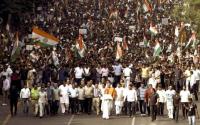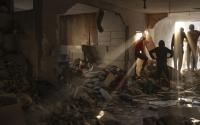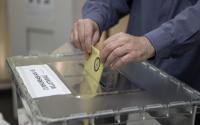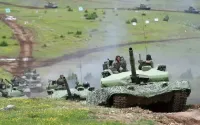28 May 2008John Wilton
Gordon Brown's anticipated decision to scrap Britain's arsenal of cluster bombs has a particular resonance for me. Last weekend - as part of Rotary International's mine clearance efforts - I visited Peja with the Mines Awareness Trust survey team. The city lies in the west of Kosovo, 520m above sea level and on the banks of Lumbardh river. The snow-capped mountains in the region rise to 2522m. The sun shone and the alpine scene was one of tranquil beauty. It was hard to take in, as the de-miners worked, that the land concealed a deadly secret. Large quantities of cluster bombs that were dropped in 1999 by British forces during the Nato bombing of Yugoslavia still lie undetected in the countryside around Peja. Each cluster bomb of this type was in the form of a canister: as it falls, it splits open and 202 bomblets are expelled. In this part of Kosovo, they were often caught in the trees. During the winter, when the leaves fell, the bomblets dropped too and were hidden under the leaves.
The clean-up started in 1999 under the auspices of the UN. But locals are still discovering areas they didn't realise were contaminated, or finding bomblets that have been missed. The area I visited hadn't been cleared before. One local expert estimates the number of bomblets at between 200 and 800 in an area the size of four football pitches. It may have taken just a couple of cluster bombs to contaminate the whole area. Landslips have carried some of the bomblets towards the stream below, where local people walk and picnic.
The minefields - one just 200m from the outskirts of the city - deny safe passage along the valley and thwart attempts by the council and local hoteliers to attract tourists back to the region. Several hundred people have been killed by unexploded ordnance over the past decade. During the weekend, we received news that a 27-year-old man had been killed. How many more must die? These are not soldiers. They are civilians, and 30% of those who lose their lives are children.
Kosovo's declaration of independence has transformed the nation: the new flag is absolutely everywhere, and many Kosovans abroad are sending money home to help rebuild the country. As the Serbs retreated, they destroyed houses and I saw many that are still in ruins. Britain is held in great esteem, despite the presence of the bomblets: local people understand that our planes were targeting the Serbs and not Kosovans. I saw no ill-feeling towards the UK. But Kosovo will now be asking more loudly for help in clearing the legacy of the Nato action.
The UK is absolutely right to phase out these bombs: they are weapons that kill more civilians than soldiers, and contaminate the countryside for years.
http://commentisfree.guardian.co.uk/john_wilton/2008/05/our_terrible_legacy.html






